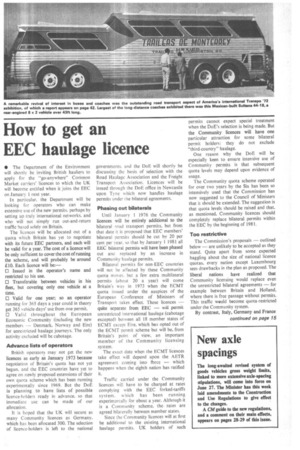How to get an EEC haulage licence
Page 15

If you've noticed an error in this article please click here to report it so we can fix it.
• The Department of the Environment will shortly be inviting British hauliers to apply for the "go-anywhere" Common Market carriers' licences to which the UK will become entitled when it joins the EEC on January 1 next year
In particular. the Department will be looking for operators who can make extensive use of the new permits. perhaps by setting up truly international networks. and who will not simply run out-and-return traffic based solely on Britain.
The licences will be allocated out of a quota which Britain has yet to negotiate with its future EEC partners, and each will be valid for a year. The cost of a licence will be only sufficient to cover the cost of running the scheme, and will probably be around £10. Each licence will be:— ID Issued in the operator's name and restricted to his use.
O Transferable between vehicles in his fleet, but covering only one vehicle at a time.
O Valid for one year; so an operator running for 365 days a year could in theory get 365 vehicle-days' use from one permit. El Valid throughout the European Economic Community (including the new members — Denmark. Norway and Eire) for unrestricted haulage journeys. The only activity excluded will be cabotage.
Advance lists of operators British operators may not get the new licences as early as January 1973 because negotiation of Britain's quota has not yet begun. and the EEC countries have yet to agree on newly proposed extensions of their own quota scheme which has been running experimentally since 1969. But the DoE is planning to have lists of possible licence-holders ready in advance, so that immediate use can be made of our allocation.
It is hoped that the UK will secure as many Community licences as Germany. which has been allocated 300. The selection of licence-holders is left to the national governments, and the DoE will shortly be discussing the basis of selection with the Road Haulage Association and the Freight Transport Association. Licences will be issued through the DoE office in Newcastle upon Tyne which now handles haulage permits under the bilateral agreements.
Phasing out bilaterals
Until January 1 1976 the Community licences will be entirely additional to the bilateral road transport permits, but from that date it is proposed that EEC members' bilateral permits should be cut by 20 per cent per year. so that by January 1 1981 all EEC bilateral permits will have been phased out and replaced by an increase in Community haulage permits.
Bilateral permits for non-EEC countries will not be affected by these Community quota moves. but a few extra multilateral permits (about 20 a year) will come Britain's way in 1973 when the ECMT quota issued under the auspices of the European Conference of Ministers of Transport takes effect. These licences — quite separate from EEC — will permit unrestricted international haulage (cabotage excepted) between all 18 member states of ECMT except Eire, which has opted out of the ECMT permit scheme but will be, from Britain's point of view, an important member of the Community licensing system.
The exact date when the ECMT licences take effect will depend upon the AETR agreement coming into fbree — which happens when the eighth nation has ratified It.
Traffic carried under the Community licences will have to be charged at rates complying with the EEC forked-tariffs system. which has been running experimentally for about a year. Although it is a Community scheme, the rates are agreed bilaterally between member states.
Since the Community licences will at first be additional to the existing international haulage permits. UK holders of such permits cannot expect special treatment when the DoE's selection is being made. But the Community licences will have one particular attraction for some bilateral permit holders: they do not exclude "third-country" haulage.
One reason why the DoE will be especially keen to ensure intensive use of Community permits is that subsequent quota levels may depend upon evidence of usage.
The Community quota scheme operated for over two years by the Six has been so intensively used that the Commission has now suggested to the Council of Ministers that it should be extended. The suggestion is that quota levels should be raised and that, as mentioned. Community licences should completely replace bilateral permits within the EEC by the beginning of 1981.
Too restrictive
The Commission's proposals — outlined below — are unlikely to be accepted as they stand. Quite apart from some expected haggling about the size of national licence quotas. every nation except Luxembourg sees drawbacks in the plan as proposed. The liberal nations have realized that Community licensing would replace even the unrestricted bilateral agreements — for example between Britain and Holland, where there is free passage without permits. This traffic would become quota-restricted under the Community system.
By contrast, Italy, Germany and France continued on page 15




































































































